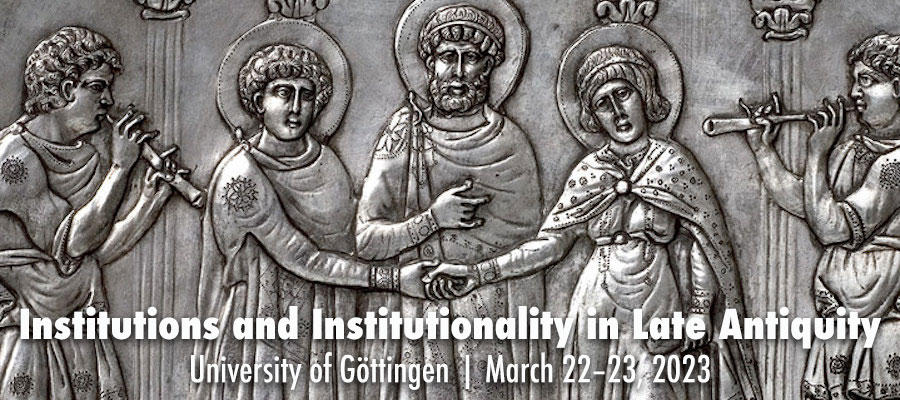Institutions and Institutionality in Late Antiquity, University of Göttingen, March 22–23, 2023
Institutions have traditionally been considered the backbone of history, not the least in research on Late Antiquity. In recent times, however, the notion of institutionality has been used to describe organizations (like the Christian church) as as well as more fluid phenomena like philosophical and monastic circles and schools. The present interdisciplinary conference aims at studying and theorizing the notions of institution and institionality in depth.
Adolf von Harnack famously termed institutions “the skeleton of history.” While for many decades institutions continued to play some role in the writing of the history of the church, in recent decades they seem to have taken a back seat. While this is an understandable corrective to the enduring focus on “illustrious men” and prominent institutions in the study of early Christianity, this conference once again takes up the question of the value and meaning of institutions in late antiquity. However, it also operates with a wider notion of institutionality which comprises not only the church as an organization with buildings and bishops but also more fluid forms of institutionality, for example, circles of philosophers or ascetics, monastic communities, or literate networks. In the light of larger trends in the humanities and social sciences, we seek more robust theorizing about late antique institutions.
Though centering on late antique Christianity, this conference intentionally adopts a wider purview—a “long” late antiquity which is geographically, socio-politically, and religiously diverse. Therefore, we solicit papers across the Mediterranean, Europe, North Africa, and the Near/Middle East, as well as papers which address the topic of institutionality in Judaism, Christianity, and Islam (and their interactions/overlaps), as well as on institutions of traditional/indigenous (“pagan”) religions and philosophical “religion”—as well as on “secular” institutions. We understand that many of these terms require methodological and theoretical reflection—and in large part this is the purpose of the conference, even while exploring such questions in relation to more localized case studies.
At this conference, we hope to address a broad range of questions, including but not limited to the following:
- What is the historiographical value of thinking with institutions?
- How do institutions help us to map thought and/or practice?
- What social-political power do institutions hold?
- What exactly constitutes an institution (or should constitute an institution)—for example, are churches institutions, and how would such substantial institutions relate to much smaller, localized institutions such as libraries, schools, or monasteries?
- How would (and did) institutions, which overlapped with one another, relate to one another? To what extent was there competition among contemporary institutions?
In order to bring together leading scholars in the field with junior researchers, we invite papers which touch directly on the conference theme, particularly case studies, and we strongly encourage submissions from early career researchers. The papers should take up one or more of the above-mentioned questions and thus contribute to the interdisciplinary exchange of ideas which is the aim of the conference. The costs of travel and accommodation will be fully covered. We plan to publish the papers from the conference as a sort of compendium to late antique institutions.
